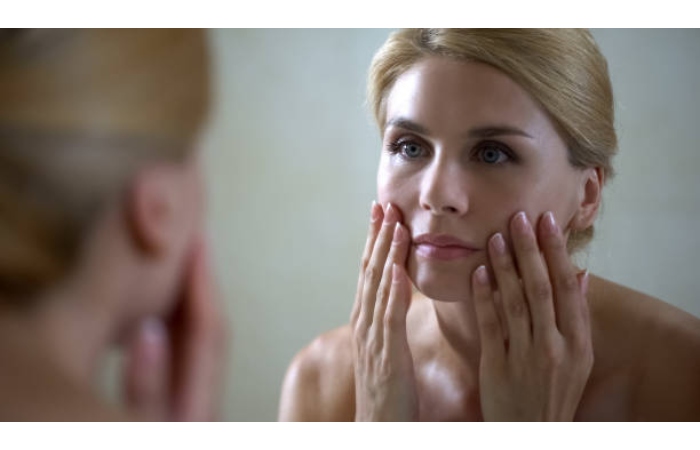Stress affects your mood and skin, as it’s one of the first parts of the body to show signs of discomfort. From causing breakouts to worsening chronic conditions, stress can wreak havoc on your skin. We’ll look at the science behind stress-induced skin issues and offer practical tips on combatting them effectively.
Understanding the Connection Amid Stress and Skin Health
Stress causes the body to food cortisol, the “stress hormone,” which has several side effects. Cortisol is one of those hormones the body releases to prepare for fight or flight, but if it is released continuously over time, it can cause many types of skin problems. When cortisol increases, oil production in the skin increases, leading to clogged pores and acne.
Also, stress can weaken the immune system, creating a challenge to protect the skin from environmental pollutants, bacteria, and other harmful agents. Stress also affects the rate at which skin cells regenerate; a slower rate means slower repair of damaged skin cells and premature ageing.
Common Skin Issues Triggered by Stress
Acne and Breakouts
Cortisol increases sebum production, combined with neglected skin care routines due to stress, which leads to clogged pores and acne.
Psoriasis and Eczema
Chronic stress can cause psoriasis or eczema to flare up, as both are caused by an overreaction of the immune system, which stress can activate.
Rosacea
Stress makes Rosacea worse because it increases blood flow to the skin, causing redness, irritation and dilation of blood vessels.
Dryness and Dehydration
When stress is applied, the skin’s barrier function is compromised, and the skin cannot retain moisture as quickly. This typically results in dry, flaky skin.
Premature Aging
Stress causes oxidative stress in the body, which destroys collagen and elastin fibres, leading to wrinkles, fine lines, and loss of skin elasticity.
Dark Circles and Puffiness
Lack of naps due to stress can cause eye strain, worsening dark circles and puffiness.
Combatting Stress-Related Skin Issues

Managing stress effectively is essential to prevent its harmful effects on your skin. Below are some practical methods that can help you combat stress and protect your skin.
Prioritize a consistent skincare routine.
A little routine can keep your skin strong against stress. Add cleansers and moisturizers (and serums) tailored to your skin type. Stick to non-comedogenic products to avoid clogged pores, especially if prone to breakouts.
Use soothing ingredients
Use skincare products that contain soothing fixings like aloe vera, chamomile, or green tea. All of these will help reduce inflammation and irritation. For deeper hydration, use products with hyaluronic acid, which locks in moisture and eliminates dryness and dullness.
Get enough rest
Not only does stress lead to lack of sleep, but lack of sleep also plays a role in skin deterioration. Get at least 7 to 8 hours of sleep each night to help your skin’s rebuilding processes.
Hydrate inside and out.
Water is essential for your skin’s elasticity and luminosity. Drink eight spectacles of water daily and use a moisturizer or hydrating mist to keep your skin hydrated and plump.
Regularly Exercise
Exercise helps reduce cortisol levels and increases blood flow, which nourishes skin cells and promotes a healthier complexion. Exercise also encourages the issue of endorphins, which naturally counteract stress.
Practice Mindfulness and Meditation
Mindfulness and thought are proven ways to decrease stress and prevent its adverse properties on the body. Just a few minutes a day can relax you, reducing the amount of cortisol you produce and making you healthier.
Eat a nutrient-rich diet.
Vitamins, minerals, and antioxidants are vital for healthy skin. Foods like leafy greens, berries, nuts, and oily fish can give your skin the nutrients it needs to fight stress-related damage.
Limit caffeine and alcohol.
Caffeine and alcohol dehydrate your skin, and stress doesn’t help either. And don’t drink too much of either; drink herbal teas or water instead.
Pamper your skin with at-home treatments.
Sometimes, a visit to a professional can provide the perfect combination of relaxation and expert care. Donna Bella, a renowned beauty salon, offers treatments designed to help reduce the impact of stress on your skin, from hydrating facials to rejuvenating peels. The personalized treatments available at salons like Donna Bella can address your specific skin concerns, leaving you refreshed and giving your skin a boost. Regular visits can become a helpful part of your self-care routine, helping your skin recover and thrive despite daily stress.
Seek professional advice
If stress significantly affects your skin and other methods aren’t helping, consider seeing a dermatologist. More persistent issues can be addressed with expert dealings like facials, chemical peels, or laser therapy.
Lifestyle Adjustments to Manage Long-Term Stress
Maintaining balance and life balance are the balances that help eliminate stress and keep your face from breaking out. Here are some lifestyle tips to keep in mind:
Time Management: Prioritize tasks and delegate tasks to avoid feeling overwhelmed.
Social Support: Spend time with friends and family who can be there for you and help you cope with stress.
Hobbies and Leisure: Engage in activities that make you happy and allow you to escape from stress mentally.
Conscious Breathing Exercises: Deep breathing is my favourite way to calm the nervous system and de-stress.
The first step to controlling the effects of stress on your skin is to know exactly how stress affects your skin. With a stress-free lifestyle and skin-friendly habits, you can maintain beautiful skin even when life isn’t so great. Prioritizing self-care and establishing a solid skincare routine can make a noticeable change in the health and advent of your skin.


